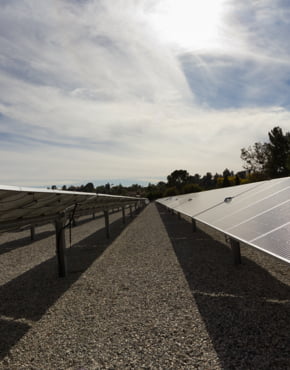Legislation authored by Assemblymember Laura Friedman will save water on California’s commercial, industrial, institutional properties
The Metropolitan Water District of Southern California has officially signed on as a co-sponsor of statewide legislation that would prohibit businesses and institutions from using drinking water to irrigate decorative or non-functional lawns.
Metropolitan joins the Natural Resources Defense Council and Heal the Bay as co-sponsors of Assembly Bill 1572, introduced by Assemblymember Laura Friedman (D-Burbank). The bill would phase out the use of potable water to irrigate non-functional grass that is not used for recreation or other purposes on commercial, industrial, municipal and institutional properties. If enacted into law, requirements would go into effect in phases, beginning in 2027. The bill does not affect properties that irrigate with recycled water or single- and multi-family residential properties.
“Pouring more and more water onto nonfunctional and ornamental turf is a losing battle that wastes drinking water and money,” Friedman said. “AB 1572 will help communities conserve water and transition to sustainable alternatives that can keep landscapes beautiful.”
“Having Metropolitan as a co-sponsor drives home the importance of responsible water stewardship, to which they have long been committed. I value their efforts and am so thankful for their partnership in moving AB 1572 forward,” Friedman added.
The proposed legislation, set to be heard in the Senate Natural Resources and Water Committee on July 3, would also require state funding to be made available for properties in disadvantaged communities before they are required to comply with the regulations.
“I want to thank our General Manager Adel Hagekhalil, Assemblymember Friedman’s office and our fellow co-sponsors Heal the Bay and NRDC for their valuable partnership and the tremendous work that went into finding a compromise that reduces non-functional turf throughout the state while shielding families and disadvantaged communities from added costs,” said Metropolitan board Chair Adán Ortega, Jr.
Locally, Metropolitan has helped change the landscape of Southern California through its turf replacement program, which offers a base rebate of $2 per square foot of grass replaced with California Friendly plants and sustainable landscape features. The program has directly resulted in the removal of more than 200 million square feet of grass, saving enough water to serve 62,000 homes annually.
“In the face of climate change, we all need to adapt to climate whiplash to ensure our communities have safe and reliable water for all with no one left behind. Climate adaptation is anchored in conservation and reducing our water consumption,” Metropolitan General Manager Adel Hagekhalil said. “Our work has paid off as residents and businesses continue to find ways to reduce their use. This legislation takes our efforts one step further – to ensure that we are making the best use of our precious resources.”
In October, Metropolitan’s board adopted a resolution strongly recommending that cities and water agencies across Southern California pass ordinances permanently prohibiting the installation and irrigation of non-functional turf in existing and new commercial, industrial and public properties, as well as HOAs. It also called for local regulations that prohibit the installation of non-functional turf in new home construction.
In November 2022, Metropolitan also joined 30 agencies across the Colorado River Basin, including several of Metropolitan’s member agencies, in signing on to a Memorandum of Understanding, committing to reduce nonfunctional turf in its service area by 30%.
The Metropolitan Water District of Southern California is a state-established cooperative that, along with its 26 cities and retail suppliers, provides water for 19 million people in six counties. The district imports water from the Colorado River and Northern California to supplement local supplies, and helps its members to develop increased water conservation, recycling, storage and other resource-management programs.
Media Contacts
